
The Book of Soul
52 PATHS TO LIVING WHAT MATTERS
ST MARTIN’S ESSENTIAL BOOKS, MAY 9, 2020
Order from an online bookseller:
Amazon
Barnes & Noble
BooksAMillion
IndieBound
Powell's
Book Passage
A NAUTILUS BOOK AWARD WINNER
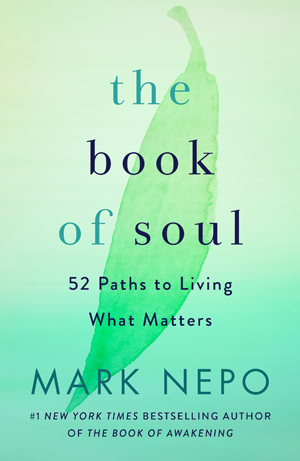

REVIEWS
Mark Nepo has long been one of my favorite spiritual writers, and The Book of Soul is further proof why. It's filled with breathtaking lines you'll want to linger over, commit to memory, and carry with you.
— Melinda Gates, New York Times Bestselling Author of The Moment of Lift
It's easy in these times to allow ourselves to slip into resignation, isolation, or despair. The Book of Soul is an antidote, a path that leads us back to our own wisdom and intuition and to the authentic truth of our souls.
— Arianna Huffington, Founder & CEO, Thrive Global and Founder, Huffington Post
Mark Nepo's The Book of Soul is like finding manna in the desert. I began reading it and instantly got chills. And a profound sense of relief. Read this book and be refreshed.
In The Book of Soul, Mark Nepo reminds us how rare it is to be here at all and how precious, real, and raw our tether to this life and each other. The insights gathered here will help you negotiate the currents of life while resting in the barest of simplicities. This book will strengthen your soul.
— Joan Borysenko, author of The PlantPlus Diet Solution and Your Soul's Compass
Mark Nepo has written another generous and valuable call to truth—at once, inspiring, enlightening, empowering, and humbling. His words and the spaces between them remind me to slow down, to explore the still unfinished and awkward places in my life, and to honor and surrender to what is sacred, pure, and often confounding but always true about being human. Nepo's commitment to transform the tumble and grist of life into insights and understandings helps me improve my life.
— George Cappannelli, Co-Founder of AgeNation
I love all Mark's books because of his deep insights and his amazing way with words, but there's something truly special about this one. It feels like a compilation of the best and most profound ideas from his work. I want to savor each and every chapter.
— Katy Koontz, Editor, Unity Magazine
There is much to explore and savor in this [new] book [by] this incredibly talented writer, storyteller, poet, and teacher. The spiritual practitioner will rejoice in Nepo's uncanny ability to consistently stretch our minds and souls with fresh musings.
— Frederic and Mary Ann Brussat, Spirituality & Practice
The Book of Soul is a piercing guide, replete with beautiful truths and startling insight, that leads us deeply into the process of transformation.
— The Edge: Holistic Living

BOOK DESCRIPTION
Beloved as a poet, teacher, and storyteller, Mark Nepo, the New York Times bestselling author of The Book of Awakening, has been called "one of the finest spiritual guides of our time," "a consummate storyteller," and "an eloquent spiritual teacher." His many books have been translated into more than twenty languages. His latest book, The Book of Soul, explores our struggle to inhabit the soul on Earth through a messy human life, and how underneath our differences, we can be who we are everywhere and create a path to what matters.
After being born physically, we unfold within a second womb, meant to incubate our better angel. The second womb is an experiential one that, through the labor of a lifetime, births the soul on Earth. This book delves into that process of transformation in its mystery, difficulty, and inevitability. It is designed to be entered a chapter each week over the course of a year, so you can weave your inner reflection into your days, letting one inform the other.
Our journey from innocence to experience is how we emerge from the second womb. The sections of this book mark the passages we all face in moving through this experiential unfolding: enduring our walk in the world, until we discover our true inheritance, which lets us live in the open by widening our circle, until we help each other stay awake.
About the book, Mark says, "It seems the purpose of suffering is to exhaust us of our differences, and the purpose of love is to awaken us to how we're at heart the same. Then, we discover that the temple is the world. Still, every life, every generation, every age takes its turn at pushing each other away, only to be loved and worn back to the one tribe we belong to. This seems even more relevant in our tense, modern world. For there is no they. We are they. We are each other. And there's a Unity that always waits below our righteousness and insistence that we know the way."

EXCERPTS
THE SPEED OF OUR AGE
 When we become entranced with what is inconsequential, we stop listening to what matters. This is how worry feeds itself, how it fills us with psychic noise. When we become entranced with what is inconsequential, we stop listening to what matters. This is how worry feeds itself, how it fills us with psychic noise.
 It's especially difficult to hear what matters in our modern age. Given our preoccupation with efficiency and productivity, it takes a quiet courage to silence our worry and agitation when we're always being told that we're falling short. Being constantly minimized makes us insecure until we swarm like lost and hungry bees for any hive that might soothe our pain of being less—less than perfect, less than beautiful, less than enough, less than what everyone expects of us, inevitably less than our dreams of love and peace. It's especially difficult to hear what matters in our modern age. Given our preoccupation with efficiency and productivity, it takes a quiet courage to silence our worry and agitation when we're always being told that we're falling short. Being constantly minimized makes us insecure until we swarm like lost and hungry bees for any hive that might soothe our pain of being less—less than perfect, less than beautiful, less than enough, less than what everyone expects of us, inevitably less than our dreams of love and peace.
 To counter the speed of our age, we're asked to open our heart wherever we are. Even though, in the press of the modern world, such softness and openness can be mistaken for being lazy, aimless, and without purpose. But sometimes we need to drift and be aimless in order to disengage the frenzy of civilization and put down our worried agendas, so we can reconnect to the underlying reality that informs everything. To counter the speed of our age, we're asked to open our heart wherever we are. Even though, in the press of the modern world, such softness and openness can be mistaken for being lazy, aimless, and without purpose. But sometimes we need to drift and be aimless in order to disengage the frenzy of civilization and put down our worried agendas, so we can reconnect to the underlying reality that informs everything.
 Harder still, we live in an age so obsessed with the new that we've been called the "disposable society." Though it's often easier to throw something out than repair it, we lose our relationship to the things around us if we discard them without honoring them. When we dispose of things without a thought, we lose the history of objects and tools and the presence they accumulate for moving through our lives. When we miss the story of touch that ordinary things carry, we lose access to the continuity of being that joins us all. The antidote to speed is to hold things and ask for their stories. Harder still, we live in an age so obsessed with the new that we've been called the "disposable society." Though it's often easier to throw something out than repair it, we lose our relationship to the things around us if we discard them without honoring them. When we dispose of things without a thought, we lose the history of objects and tools and the presence they accumulate for moving through our lives. When we miss the story of touch that ordinary things carry, we lose access to the continuity of being that joins us all. The antidote to speed is to hold things and ask for their stories.
 In time, not listening to what matters lets us become preoccupied with the noise of the world until the noise of our minds becomes an ingrained pattern that we need to break. So while considering the speed and noise of our efficient and disposable world, let's look at three more ways of not listening: judgment, illusion, and the appetite for more. In time, not listening to what matters lets us become preoccupied with the noise of the world until the noise of our minds becomes an ingrained pattern that we need to break. So while considering the speed and noise of our efficient and disposable world, let's look at three more ways of not listening: judgment, illusion, and the appetite for more.
 Judging others overlays the truth of what is with a screen of our preferred conclusions. For judgment, the kind that debases and elevates, distances us from the experience of others. It keeps us from learning the truth of what's before us. For example, when I judge a friend who is late as not caring, I may never know that they stopped to help a stranger who fell along the way. In time, the cost of such judgment is that it becomes a clear wall we construct around ourselves to make others think there is no wall, until they go to touch us or we reach out and no one can get through. To see and not be touched drains us of our aliveness—like smelling fruit without ever being able to eat it. Judging others overlays the truth of what is with a screen of our preferred conclusions. For judgment, the kind that debases and elevates, distances us from the experience of others. It keeps us from learning the truth of what's before us. For example, when I judge a friend who is late as not caring, I may never know that they stopped to help a stranger who fell along the way. In time, the cost of such judgment is that it becomes a clear wall we construct around ourselves to make others think there is no wall, until they go to touch us or we reach out and no one can get through. To see and not be touched drains us of our aliveness—like smelling fruit without ever being able to eat it.
 I remember a professor in graduate school who judged all modern poetry as outside the rigor and excellence of the classics. He denigrated all contemporary attempts at expression. When his wife died suddenly, I offered him an anthology of poems about loss and grief filled with some of the most gifted and compassionate voices of our age. Though I could see the face under his face tremble, he coldly thanked me and tossed the book in the garbage. More than being rude, he was sealing himself within his clear wall of judgment, ensuring his deep loneliness in a place no one could reach. I remember a professor in graduate school who judged all modern poetry as outside the rigor and excellence of the classics. He denigrated all contemporary attempts at expression. When his wife died suddenly, I offered him an anthology of poems about loss and grief filled with some of the most gifted and compassionate voices of our age. Though I could see the face under his face tremble, he coldly thanked me and tossed the book in the garbage. More than being rude, he was sealing himself within his clear wall of judgment, ensuring his deep loneliness in a place no one could reach.
 Illusion stems from forcing our preferred understanding of life on all the situations we meet, as we become more interested in sameness than growing. Working to sustain illusion is its own hell. I remember watching a polo match years ago when a horse broke its leg. The far side of the field was where the club members sat. Two field boys with puffy sleeves ran out to hold up a blanket, shielding the fallen horse from the club members, as we on the other side of the field watched someone shoot the horse in the head. Holding up the blanket to shield the club members is a metaphor for the effort to sustain illusion, to pretend that life is other than it is, while in reality the blanket is not shielding anything. Illusion stems from forcing our preferred understanding of life on all the situations we meet, as we become more interested in sameness than growing. Working to sustain illusion is its own hell. I remember watching a polo match years ago when a horse broke its leg. The far side of the field was where the club members sat. Two field boys with puffy sleeves ran out to hold up a blanket, shielding the fallen horse from the club members, as we on the other side of the field watched someone shoot the horse in the head. Holding up the blanket to shield the club members is a metaphor for the effort to sustain illusion, to pretend that life is other than it is, while in reality the blanket is not shielding anything.
 And the appetite for more is as old as time. In ancient Greece, pleonektein, from which we get the word "pleonexia," referred to a condition in which a person lived with an insatiable appetite for more of everything. The Christian theologian William Barclay defined pleonexia as a cursed love of having. Plato and Aristotle thought this condition to be the source of greed. This is a dangerous form of not listening that plagues the modern world. It speaks to our "fill-'er-up" society in which we think eating will keep us from the threshold of emptiness, and noise will keep us from the threshold of silence, and adventure will keep us from the threshold of being ordinary. When all the while, it's through the thresholds of emptiness, silence, and being ordinary that the true gifts of being alive wait to be discovered. And the appetite for more is as old as time. In ancient Greece, pleonektein, from which we get the word "pleonexia," referred to a condition in which a person lived with an insatiable appetite for more of everything. The Christian theologian William Barclay defined pleonexia as a cursed love of having. Plato and Aristotle thought this condition to be the source of greed. This is a dangerous form of not listening that plagues the modern world. It speaks to our "fill-'er-up" society in which we think eating will keep us from the threshold of emptiness, and noise will keep us from the threshold of silence, and adventure will keep us from the threshold of being ordinary. When all the while, it's through the thresholds of emptiness, silence, and being ordinary that the true gifts of being alive wait to be discovered.
 None of this is easy. And with so many ways of not listening, we can easily miss our next teacher. Still, the true gifts of being alive show themselves in the simplest things that wait at every corner underneath the speed of our age. Our next teacher could be in a breeze that crosses our face, asking us to turn. And when we turn, we might be seized by the light in a certain way. And through that light, we might see the face of someone we're supposed to love. But if we don't turn, we won't meet the person we're supposed to love. It doesn't mean we will never know love. We just might wind up missing what we're supposed to learn. None of this is easy. And with so many ways of not listening, we can easily miss our next teacher. Still, the true gifts of being alive show themselves in the simplest things that wait at every corner underneath the speed of our age. Our next teacher could be in a breeze that crosses our face, asking us to turn. And when we turn, we might be seized by the light in a certain way. And through that light, we might see the face of someone we're supposed to love. But if we don't turn, we won't meet the person we're supposed to love. It doesn't mean we will never know love. We just might wind up missing what we're supposed to learn.
 All the spiritual traditions ask us to listen, that is, to move closer to what matters through the work of being, and to quiet the noise in our mind so we can return to an unscripted moment where the glow and pulse of life can show itself. All the contemplative practices ready us for the space that is stung open when a father dies or a dream shatters or we find ourselves in exile or put upon—and there's nothing to do except sit and be with the mystery of what is. The only way to silence the speed and noise of the tiger is to sit before the world with an open heart as our lives finally open. All the spiritual traditions ask us to listen, that is, to move closer to what matters through the work of being, and to quiet the noise in our mind so we can return to an unscripted moment where the glow and pulse of life can show itself. All the contemplative practices ready us for the space that is stung open when a father dies or a dream shatters or we find ourselves in exile or put upon—and there's nothing to do except sit and be with the mystery of what is. The only way to silence the speed and noise of the tiger is to sit before the world with an open heart as our lives finally open.
ORIGINAL STEPS
A bull contents himself with one meadow, and one forest is
enough for a thousand elephants; but the little body of man
devours more than all other living creatures.
— Seneca the Younger
 Our concern about nature and the environment has ancient roots. For we have always struggled between using up the Earth and honoring it. In the aftermath of the Iraqi war, many artifacts were unearthed, including a clay tablet discovered in the Kurdistan region of Iraq, which has added twenty lines to The Epic of Gilgamesh, one of the oldest narratives known to humanity. The twelve original Assyrian tablets date back to 2000 B.C. The newly found tablet was acquired from looters by the Sulaymaniyah Museum for $800. Our concern about nature and the environment has ancient roots. For we have always struggled between using up the Earth and honoring it. In the aftermath of the Iraqi war, many artifacts were unearthed, including a clay tablet discovered in the Kurdistan region of Iraq, which has added twenty lines to The Epic of Gilgamesh, one of the oldest narratives known to humanity. The twelve original Assyrian tablets date back to 2000 B.C. The newly found tablet was acquired from looters by the Sulaymaniyah Museum for $800.
 The story of Gilgamesh centers on an enervated and self-centered king who declares war against the nature deity, Humbaba, in hopes of securing eternal fame. Into this war, he drags his only friend, Enkidu. The story of Gilgamesh centers on an enervated and self-centered king who declares war against the nature deity, Humbaba, in hopes of securing eternal fame. Into this war, he drags his only friend, Enkidu.
 The newly discovered lines to the epic reveal a sense of guilt and remorse in Enkidu for having killed the nature deity and for having decimated the Cedar Forest, the home of Humbaba. Enkidu says, "We have reduced the forest [to] a wasteland." His anxiety about offending the gods has Enkidu imagine an angry god, Enlil, asking Enkidu and Gilgamesh when they arrive home, "What was this wrath of yours that you went trampling the forest?" The newly discovered lines to the epic reveal a sense of guilt and remorse in Enkidu for having killed the nature deity and for having decimated the Cedar Forest, the home of Humbaba. Enkidu says, "We have reduced the forest [to] a wasteland." His anxiety about offending the gods has Enkidu imagine an angry god, Enlil, asking Enkidu and Gilgamesh when they arrive home, "What was this wrath of yours that you went trampling the forest?"
 It's timely that this story should surface in our modern world. For this question from our better angels has been ringing in our ears for centuries, and is even more pertinent today. What is the source of the wrath that we fester and carry that enables us to trample the forest, the planet, and each other—again and again? It's timely that this story should surface in our modern world. For this question from our better angels has been ringing in our ears for centuries, and is even more pertinent today. What is the source of the wrath that we fester and carry that enables us to trample the forest, the planet, and each other—again and again?
 In truth, our ecological problems are evidence of a deeper, spiritual problem whereby we keep shrinking our circle of compassion; whereby we, feeling empty, use everything up in an attempt to fill ourselves; whereby we, feeling insignificant and ephemeral, mark up the Earth in order to feel important and lasting; whereby we, feeling incomplete, break apart anything that is whole. In truth, our ecological problems are evidence of a deeper, spiritual problem whereby we keep shrinking our circle of compassion; whereby we, feeling empty, use everything up in an attempt to fill ourselves; whereby we, feeling insignificant and ephemeral, mark up the Earth in order to feel important and lasting; whereby we, feeling incomplete, break apart anything that is whole.
 Since the beginning of the human trek through time, we've tried to silence our fear of death by puffing ourselves up and by making a lot of noise. When feeling less than, we've tried to hoard jewels and power. When desperate to feel, we've propagated violence for its shock and alarm. Since the beginning of the human trek through time, we've tried to silence our fear of death by puffing ourselves up and by making a lot of noise. When feeling less than, we've tried to hoard jewels and power. When desperate to feel, we've propagated violence for its shock and alarm.
 Despite all this, each of us is born with a filament of being, which goes by many names. Essentially, under all our angst and stress, there's a pilot light of Spirit that we steward while here. Despite all the things we break, our filaments of being innately want to join. In this way, we're born to complete each other: each of us arriving with an inclination, a yearning for other life. This is a form of spiritual pollination, the inadvertent way that we long for the nectar of others and leave traces of the Spirit we steward wherever we love. Despite all this, each of us is born with a filament of being, which goes by many names. Essentially, under all our angst and stress, there's a pilot light of Spirit that we steward while here. Despite all the things we break, our filaments of being innately want to join. In this way, we're born to complete each other: each of us arriving with an inclination, a yearning for other life. This is a form of spiritual pollination, the inadvertent way that we long for the nectar of others and leave traces of the Spirit we steward wherever we love.
 Those born in the deep pollinate the world with their depth. Those born in the world pollinate the introverted with the world. And those who cross both ways—bringing the deep and the worldly together—are ambassadors of Wholeness. Though we can be agitated into breaking and destroying, we're always a breath away from the innate pull of being and joining, of loving and completing each other. As the world comes alive each spring because of thousands of pollinations, there's a renaissance of care that blossoms in each generation from the spiritual pollination we are all born to partake of. Those born in the deep pollinate the world with their depth. Those born in the world pollinate the introverted with the world. And those who cross both ways—bringing the deep and the worldly together—are ambassadors of Wholeness. Though we can be agitated into breaking and destroying, we're always a breath away from the innate pull of being and joining, of loving and completing each other. As the world comes alive each spring because of thousands of pollinations, there's a renaissance of care that blossoms in each generation from the spiritual pollination we are all born to partake of.
 While there are infinite ways to stumble and do harm, the purpose of consciousness is to reduce the distance between who we are and what we do, between what we know and how we care. While there are infinite ways to stumble and do harm, the purpose of consciousness is to reduce the distance between who we are and what we do, between what we know and how we care.
 We've always known that we must care for the Earth as we care for ourselves, though we've always turned away from this truth. In Denali National Park in Alaska, the permafrost, just below the surface, is a delicate fabric that holds the earth together. When trampled, the fabric that holds things together is broken. Therefore, in Denali, hikers are asked not to walk in the same place twice, not to form or follow a path. Instead of one following another, hikers are asked to walk side by side. In this way, without design or intention, a network of original steps is formed that keeps things together, rather than singular grooves that are deepened into ruts that will split things apart. In just this way, the life of a community depends on how we care for the ground we stand on and how we step lightly, walking side by side. We've always known that we must care for the Earth as we care for ourselves, though we've always turned away from this truth. In Denali National Park in Alaska, the permafrost, just below the surface, is a delicate fabric that holds the earth together. When trampled, the fabric that holds things together is broken. Therefore, in Denali, hikers are asked not to walk in the same place twice, not to form or follow a path. Instead of one following another, hikers are asked to walk side by side. In this way, without design or intention, a network of original steps is formed that keeps things together, rather than singular grooves that are deepened into ruts that will split things apart. In just this way, the life of a community depends on how we care for the ground we stand on and how we step lightly, walking side by side.
DISTRIBUTING THE WEIGHT
Everybody's hurt. What is important, what corrals you,
what bullwhips you, what drives you, torments you, is that
you must find some way of using this to connect you with
everyone else alive. This is all you have to do it with.
— James Baldwin
 You and I have talked for years, like fish mouthing pebbles along the bottom for something small that might keep us going. And, as often happens, I was moved by our conversation last night. I understand how you feel the presence of suffering always in the background, juxtaposed against the peaceful times and moments of abundance we chance upon. I've felt this too and have come to sense that we all take turns in these places, and that it does no good for everyone to be suffering at once. When blessed to be well, we balance the world by being conduits of light for the time being, as long as we stay touchable. You and I have talked for years, like fish mouthing pebbles along the bottom for something small that might keep us going. And, as often happens, I was moved by our conversation last night. I understand how you feel the presence of suffering always in the background, juxtaposed against the peaceful times and moments of abundance we chance upon. I've felt this too and have come to sense that we all take turns in these places, and that it does no good for everyone to be suffering at once. When blessed to be well, we balance the world by being conduits of light for the time being, as long as we stay touchable.
 The ever-present call of compassion is to widen our circle and never close our hearts to those in need. This doesn't substitute for helping others in real time. But when unable to help, our commitment to feeling blessed when we are blessed adds light to the dark and distributes the weight of the world, as long as we let in the pain of others. When suffering myself, I've felt discarded by those who remain self-enclosed in their happiness, but I've also felt uplifted by the happiness of those who don't forget those who are hurting. Their tenderness arrives like the sun warming me in my painful places. The ever-present call of compassion is to widen our circle and never close our hearts to those in need. This doesn't substitute for helping others in real time. But when unable to help, our commitment to feeling blessed when we are blessed adds light to the dark and distributes the weight of the world, as long as we let in the pain of others. When suffering myself, I've felt discarded by those who remain self-enclosed in their happiness, but I've also felt uplifted by the happiness of those who don't forget those who are hurting. Their tenderness arrives like the sun warming me in my painful places.
 The plight of the less fortunate is always with me. This awareness led me to write this poem: The plight of the less fortunate is always with me. This awareness led me to write this poem:
IN THE MILKY OCEAN
As you pour milk on your cereal, I am
grateful for the sound of milk flowing over
dried grain, for the peace that lets us wake
and eat together, to stare at each other in
silence like small animals. I am aware how
safely tumbled through Eternity we are. Not
to be hunted from birth. Or chased into the
forest and forced to part. Or beaten for a
secret some warlord thinks we're hiding. I
eat my toast and close my eyes. How is it
we're alive in a place that has running water,
where milk and eggs are plentiful? Atrocities
and wonders flutter through me. They bleed
into each other. I can't stop it. The milk
tastes good as my twin is somewhere on
the run. It seems impossible to feel so
many fates at once. Impossible not to.
 Still, there are days I forget and days I'm too wrapped up in my own fear to remember the connection between us all. And when finally resting in the smallest inch of beauty, I can fear that letting your pain in will sink me back into my terrible darkness—as if we own the beauty and peace that move through us. On good days, I remember that we're called to let this borrowed inch of light pass on to someone else who has fallen back into the tangle of suffering we're all a part of. Inevitably, we're asked to be channels for what we're given, beyond our collapse into feeling small and dark. Still, there are days I forget and days I'm too wrapped up in my own fear to remember the connection between us all. And when finally resting in the smallest inch of beauty, I can fear that letting your pain in will sink me back into my terrible darkness—as if we own the beauty and peace that move through us. On good days, I remember that we're called to let this borrowed inch of light pass on to someone else who has fallen back into the tangle of suffering we're all a part of. Inevitably, we're asked to be channels for what we're given, beyond our collapse into feeling small and dark.
 When we can accept all that we're capable of, including the ways we can be insensitive and cruel, then we have a felt-basis for understanding and accepting the full humanity in everyone. This is the humble threshold to releasing our compassion. In this way, self-acceptance is the gateway to accepting the world, not accepting all that we do to each other, but believing in our inborn capacity, in spite of all we do, to repair what we do to each other. When we can accept all that we're capable of, including the ways we can be insensitive and cruel, then we have a felt-basis for understanding and accepting the full humanity in everyone. This is the humble threshold to releasing our compassion. In this way, self-acceptance is the gateway to accepting the world, not accepting all that we do to each other, but believing in our inborn capacity, in spite of all we do, to repair what we do to each other.
 It's taken me years to understand that wisdom waits in those who suffer. And since we all suffer, we all have a wisdom that is sorely needed. We each earn a view that the rest of us need. And yet we shy away from asking those in pain, "What has your pain opened?" From asking those near death, "From this great height, what do you see of life?" From asking those on the other side of fear, "What has all that trembling revealed?" It's taken me years to understand that wisdom waits in those who suffer. And since we all suffer, we all have a wisdom that is sorely needed. We each earn a view that the rest of us need. And yet we shy away from asking those in pain, "What has your pain opened?" From asking those near death, "From this great height, what do you see of life?" From asking those on the other side of fear, "What has all that trembling revealed?"
 What we drop, others pick up. What we lose, others find. What we forget, others remember. What we love spreads like weeds. Our lives and all we go through seed a spring we'll never see. What we drop, others pick up. What we lose, others find. What we forget, others remember. What we love spreads like weeds. Our lives and all we go through seed a spring we'll never see.
 I was changed by our conversation last night, because we pulled aside our veils and came closer to the truth than ever before. Ultimately, we're here to suffer when we suffer, and to put down all we carry and accept joy when it comes, so we can balance out the weight of being here. This is the noble anonymity of care. I was changed by our conversation last night, because we pulled aside our veils and came closer to the truth than ever before. Ultimately, we're here to suffer when we suffer, and to put down all we carry and accept joy when it comes, so we can balance out the weight of being here. This is the noble anonymity of care.
A CONVERSATION WITH MARK NEPO ABOUT HIS NEW BOOK,
THE BOOK OF SOUL: 52 PATHS TO LIVING WHAT MATTERS
What are you trying to explore with this book?
In The Book of Soul, I explore our struggle to inhabit the soul on Earth through a messy human life, and how underneath our differences, we can be who we are everywhere and create a path to what matters. It seems the purpose of suffering is to exhaust us of our differences, and the purpose of love is to awaken us to how we're at heart the same. Then, we discover that the temple is the world. Still, every life, every generation, every age takes its turn at pushing each other away, only to be loved and worn back to the one tribe we belong to. This seems even more relevant in our tense, modern world. For there is no they. We are they. We are each other. And there's a Unity that always waits below our righteousness and insistence that we know the way.
How does this book evolve where your other books leave off?
As I get older, I am sent into wonder by the deeper questions which keep reminding me how rare it is to be here at all and how precious, real, and raw our tether to this life and each other. This book offers a culminating weave of where life has taken me, to death and back, into the barest of simplicities, for which I am grateful.
Can you describe the journey this book takes us on?
After being born physically, we unfold within a second womb, meant to incubate our better angel. The second womb is an experiential one that, through the labor of a lifetime, births the soul on Earth. This book delves into that process of transformation in its mystery, difficulty, and inevitability. Our journey from innocence to experience is how we emerge from the second womb. The sections of this book mark the passages we all face in moving through this experiential unfolding: enduring our walk in the world, until we discover our true inheritance, which lets us live in the open by widening our circle, until we help each other stay awake. And because things that matter take time, I've designed this journey as a weekly reader, to be entered a chapter each week over the course of a year, so you can weave your inner reflection into your days, letting one inform the other.
You speak a lot about our struggle to stay open. How does opening help us live more fully?
Like all forms of life, we open and close constantly. The human tribe, at its best, is resilient, and, at its worst, relentlessly stubborn. We've spent centuries trying to keep things apart when everything in life wants to come together. We've worked hard to separate light from dark when together they form the threshold of depth. We've tried desperately to separate beauty from suffering when it's beauty that softens our suffering. We've willfully insisted on separating good from bad when the heart burns both in the fire of compassion. And in our terror, we're frantic to separate life from death when each soul on Earth is a conduit between them. Every part of life is an intersection and emblem of all life. As a seed carries a fully-grown tree and a spark ignites the life of fire, we each carry the shimmer of all there is.
To live this fully, we have to take off our armor and let things in. Then the soul has a chance to show itself. Through our immersion in being here and our devotion to do so kindly, we begin to enliven our compassion. This helps us endure our walk in the world. Like a comet worn to its center by the time it reaches Earth, the gravity of our journey leaves us bare and unadorned as we reach the simple, enduring center where all souls meet.
This is the purpose of the human journey: to live openly and honestly until we become a source of uncovered light. Then life pours out of us to renew us and all we meet.
Can you speak to our challenge to both survive and thrive?
We're shaped by what we go through, hollowed out by the storms of time. And the speed of our age only intensifies the pull of existence. Against these wearing forces, we have enduring tools to use, such as our ability to be wholehearted, the power of how we're informed by what we love, and the chance to be immersed in life and devoted to living. As we move from surviving to thriving and back, our walk in the world can wear us down or lift us up, depending on how often we remember that we're part of something larger, depending on how thoroughly we can bathe trouble in the well of our soul. Yet no one can do any of this alone. It's letting each other in that can distribute the weight of suffering, which no one can escape. It's holding each other in our pain that can invoke the resting place of joy that always surprises us. Our walk in the world is always precarious, as we find our way between burden and grace, falling down and getting up as many times as necessary.
Can you say more about the nature of meaning, truth, and kindness?
Meaning, truth, and kindness are our constant teachers. They help us live through fear, pain, and disappointment. They are flames that light the heart.
By its very nature, meaning is gathered and enlivened through relationship. It is the practice of making sense of our experience, the practice of living as an awakened part in an awakened Whole. By its nature, truth is gathered and enlivened through deep presence and deep listening. It is the practice of seeing and receiving things-as-they are, the practice of living with the bareness of being. And kindness is enlivened and released through the risk of immediate care. It is the practice of allowing compassion to guide us, the practice of uncovering our intimacy with all things. Together, meaning, truth, and kindness braid into a thread that connects everything, a thread that we can hold onto, no matter the storm.
The long conversation of this book is offered as a way to personalize your own relationship with meaning, truth, and kindness: as a way to personalize your own practice of living as an awakened part in an awakened Whole, as a way to personalize your own practice of living with the bareness of being, and as a way to personalize your own practice of being intimate with all things.
Can you share a story from the book?
Yes. I heard this story from a Peace Corps worker, just home from living for two years in Nigeria. The story comes from his closest friend there, Koofah. This happened while Koofah was traveling with a driver from the village of Akbuyo to Lagos, a city near the sea.
One night, when neither could sleep, Koofah told him, "It was widely known that one shouldn't travel at night through these regions. Cars have been known to be bombed and held up. Bandits will slit your throat. It was a six-hour drive and we'd planned enough time to make it to the sea by dusk. Along the way, near Fiditi, there was an accident. A truck hit the side of a car in front of me. The trucker was fine and went on his way without even getting out, but the man in the car was hurt. He had broken his shoulder and was cut up. We were afraid to move him. We made him comfortable and drove to the next town for help—an hour drive. We found the hospital and asked for an ambulance to be sent. But they didn't have an ambulance and there were no doctors in the hospital. They wouldn't be back for three days. Now I was stuck. I didn't know what to do. If we went back for him, we'd never cross the desert before nightfall. I told myself, it wasn't a completely barren road, where the man was hit. Someone else would come along, and they would bring him to the hospital. Even so, there were no doctors. I didn't know what to do. I was afraid of falling prey in the night desert. I'm ashamed to say, I left him there. We kept our pace. I never knew what happened to him. It's been years, but to this day, I regret not going back."
Like so many of us, Koofah never found his courage. He resisted the impulse of kindness in his heart and is now caught replaying his missed opportunity forever. And so, whether to care for those we meet along the way or keep our appointments frames the tipping point of our will.
What does it mean to be a spiritual warrior in our own time?
When we speak of being a spiritual warrior, a concept referred to in many traditions, we're describing a journey of transformation that is steadfast in its adherence to both love and truth in the face of the constant storms that life on Earth generates. The word war itself traces back to the Indo-European root, wers, which means "to confuse, mix up." War and the inevitable conflict it produces—both within us and between us—stem from a state of confusion. Thus, a spiritual warrior is one devoted to the clearing and cleansing of confusion, both inwardly and out in the world.
Staying devoted to an atmosphere of spirit, until we clear all confusion and establish enduring roots is our true inheritance. This is the work of a spiritual warrior, a veteran of life, not just individually but in community. This work is indispensable and elusive, ours alone to do and impossible to do alone. And few things are more worthwhile to pursue. More than ever, we need spiritual warriors to clear confusion in the world while staying devoted to establishing enduring roots.
What is your hope for anyone engaging with this book?
It is my hope that reading this book will help you listen to what love and suffering open us to, so we can drink from that well and build a better world. While we can talk, ultimately, we make no ground until we listen: to each other, and to the current of humanity from which we rise and return. We only have one turn at being here together, before we pass what we've done or not done to the next generation. It is my hope that this book will help you discover our kinship as human beings.
|

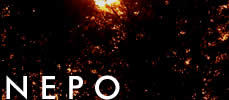

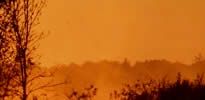



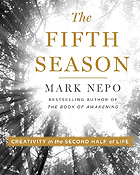
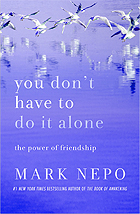
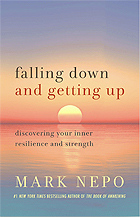
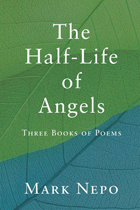
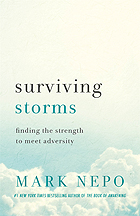
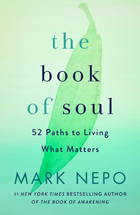
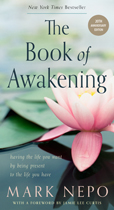

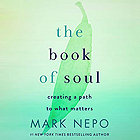
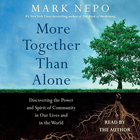
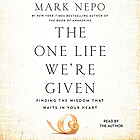

 When we become entranced with what is inconsequential, we stop listening to what matters. This is how worry feeds itself, how it fills us with psychic noise.
When we become entranced with what is inconsequential, we stop listening to what matters. This is how worry feeds itself, how it fills us with psychic noise.


